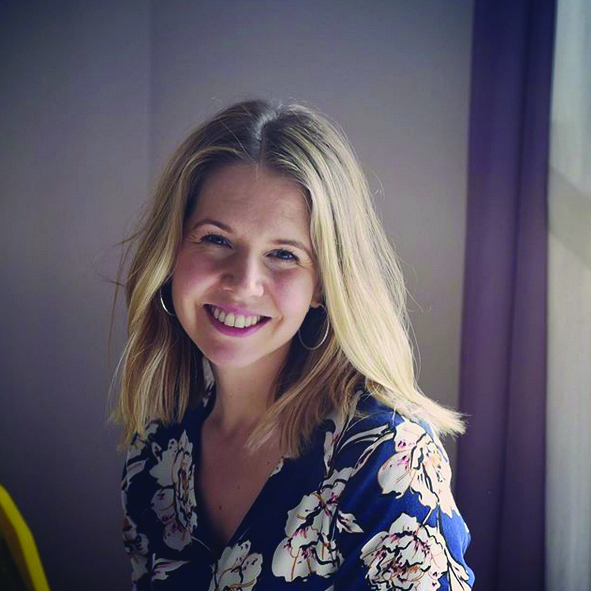by Erin Strybis
As far as Bible characters go, I’ve always identified more with Martha than Mary. In Luke 10:38-42, when Martha opens her home to Jesus and his disciples, I understand why she’s “distracted with many things.” The disciples were likely tired, smelly and a bit hangry from journeying alongside Jesus. Have you ever tried to host a dozen or more guests? That’s a lot of mouths to feed.
Last spring, I opened up my own home to a new group. It was my first time hosting our neighborhood book club, and I wanted to get everything right. So I planned healthy, delicious appetizers, bought extra wine glasses and discerned the perfect living-room arrangement for facilitating conversation. I even agonized over what I couldn’t fix — the dated window treatments that had come with the house, peeling baseboards and an old couch we hoped to sell.
On the day of book club, as my guests entered I couldn’t help but busy myself with tasks to make them more comfortable. Pouring wine and restocking food became a welcome distraction from the insecurities I harbored about our house. (An aside: What is it that makes us hold so much shame about our homes?) Though I am beyond blessed with a comfortable, beautiful home, I worried about how my neighbors would perceive it and, also, me. If I played the role of hostess just right, I could win over these relatively new friends.
God wants to be in relationship with us
 Sound familiar? Like Martha, my hostess-heart hoped to earn my guests’ affection through service. Because I busied myself with many things, I nearly missed the one thing we had all gathered for — to spend time with each other. Unlike Martha, I had no sister to complain about to Jesus, but I needed his kind, hard rebuke just as much as she did.
Sound familiar? Like Martha, my hostess-heart hoped to earn my guests’ affection through service. Because I busied myself with many things, I nearly missed the one thing we had all gathered for — to spend time with each other. Unlike Martha, I had no sister to complain about to Jesus, but I needed his kind, hard rebuke just as much as she did.
“Martha, Martha, you are worried and distracted by many things; there is need of only one thing,” Jesus says. “Mary has chosen the better part, which will not be taken away from her” (Luke 10:40-42).
As readers, we might be surprised by Jesus’ words. Shouldn’t he be criticizing Mary for leaving her sister with all the work? Instead, he praises her for sitting at his feet and listening.
I don’t think Jesus is being an ungrateful house guest here. His words offer us hope and show us that he desires to be in relationship with us. This Bible story shows us that God loves us not for what we do but who we are — God’s children. God does not need us to busy ourselves with passing and refilling wine glasses or gathering up dirty dishes; God wants us to open our hearts to God’s presence.
Once I finally did allow myself to settle in and be present to my book club, I realized that my guests had barely noticed all the flaws in my house. While they appreciated being served, they seemed relieved when I finally sat down and engaged in conversation. Free of distractions, I had a chance to listen and grow in relationship with them.
God’s love is unconditional
So we’ve established that God does not love us for what we do. Yet the reality of being a person in the world is that at some point you have to do the dirty dishes. With so many distractions—technology being chief among them for us—we may find we are not always up to the task of simply doing life. Or maybe we find we’re so distracted by doing life, we forget to care for our souls.
Scripture offers guidance when we feel weighed down by our many tasks, like Martha, or when we find ourselves frustrated by our shortcomings and sins. We may feel spiritually parched.
Ephesians 2:8-9 tells us, “For by grace you have been saved through faith, and this is not your own doing; it is the gift of God—not the result of works, so that no one may boast.”
We can find peace and rest in the knowledge that the trappings of this world aren’t the end goal. There is more to the story. Because God knew we could not save ourselves, he sent his only son Jesus into the world to save us from sin, and God prepares a place for believers in heaven.
This is the greatest love story of the Bible. God loves us so much God rescues us and gives us new life. To know I am helpless—drowning—in my sin is both humbling and freeing.
To be grounded by grace means living with an awareness that there is nothing we can do to save ourselves—God’s got that covered. Thanks be to God.
Discussion questions
- How would you describe yourself: like a Martha or a Mary?
- Do you have a verse or story you often turn to for comfort? What does scripture tell you about God’s love?
- Why is unconditional love so radical for the church and society?
Closing prayer
Heavenly God, We know we don’t have to earn your love, but sometimes we forget. More than anything, you crave a relationship with us and love without conditions. You love us so much you gave your only son Jesus as a living sacrifice. Lift our anxious hearts with the hope of his life, death and resurrection. Amen.
 Erin Strybis is a lifelong Lutheran, mother of one and voracious reader who believes in the healing power of stories. Find more of her stories at erinstry.com or on Instagram (@erinstry).
Erin Strybis is a lifelong Lutheran, mother of one and voracious reader who believes in the healing power of stories. Find more of her stories at erinstry.com or on Instagram (@erinstry).

